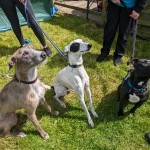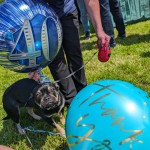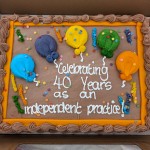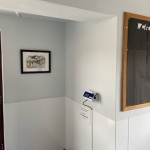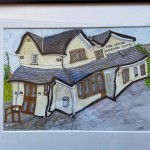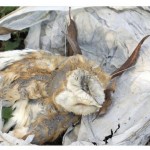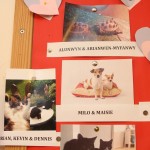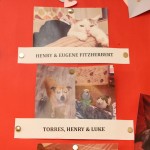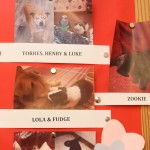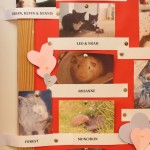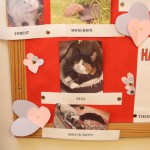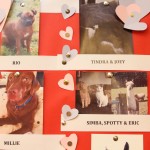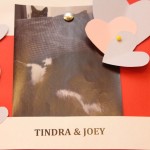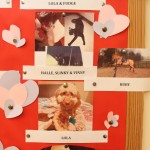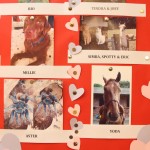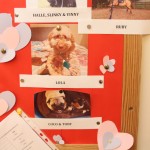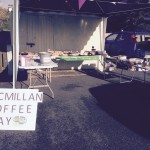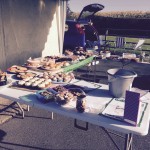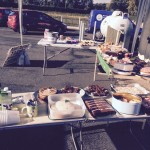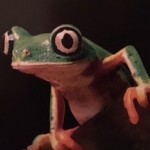What's new
MacMillan Day 2024
🤩🥁 DRUMROLL PLEASEEEE .... 🥁🤩 Thanks to our amazingly generous clients and colleagues, this year we raised a whopping .... £1183.63 for Macmillan!!
Special shout out to Nurse Laura who masterminded the whole event and helped us raise such an amazing grand total!! 🥰
Thanks to everyone for your support this year it was an amazing event!! ❤️
Rose Cottage's 40th Anniversary!!
Can you believe Rose Cottage has been open for 40 years this year?! Opened by Norman Henry in 1984, we have treated and cared for thousands upon thousands of animals in this time and have made some amazing clients for life. To celebrate we held a little get together at the practice, with copious amounts of cake, coffee and dog kisses and it was great to catch up with you all! We also created a photo collage in reception to reminisce which we welcome you to have a nosey at! We've got Jen the Vet taking a Lions temperature, Ken the vet in the midst of operating and Liz the vet assisting with Pelican X-rays just to name a few! We really are about as 'mixed' as a mixed practice can get and we're so proud to be able to help such a wide variety of species! From puppies to piglets and gennets to geese, we care for all these animals as if they were our own. Amongst all this fun we also raised £500 for the Cheshire Sighthound Rescue Charity to help with all the amazing work they do!
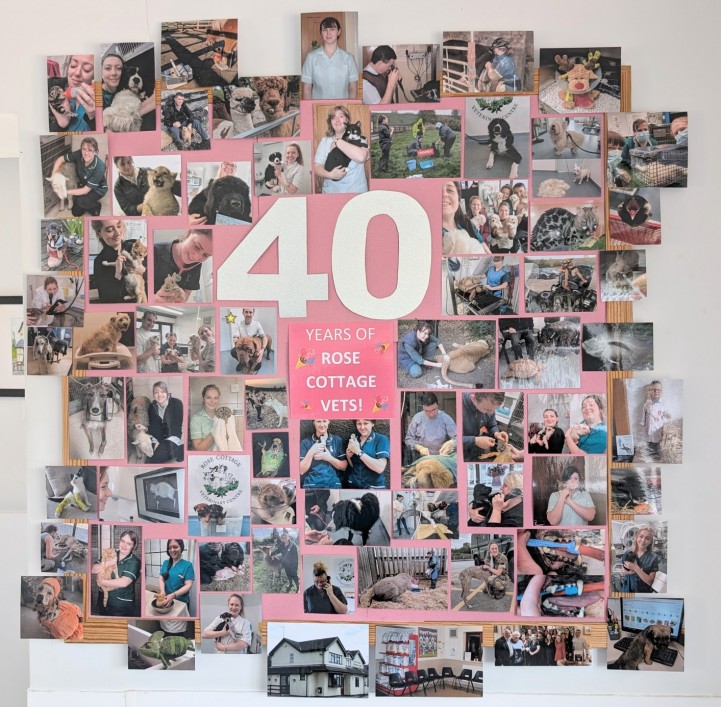
🫶🏼Happy International Women's Day!🫶🏼
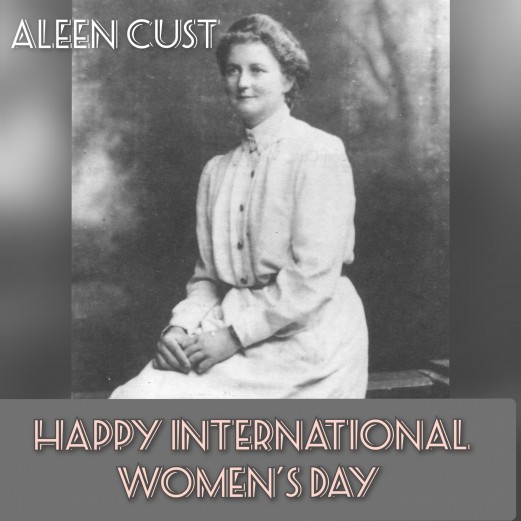
This year we thought it fitting to pay homage to Aleen Cust, the worlds first registered Female Veterinary Surgeon. Despite the Veterinary profession being founded in 1762, it wasn't until 1922 that it was finally legal for women to achieve MRCVS status! 😱
Aleen Cust had actually already been practicing as a very successful Vet for 22 years prior to this, despite not having been eligible to register with the RCVS.
✊🏼We stand on the shoulders of women like Aleen, and thank them for breaking the mold proving that this 'hard, physical and dangerous labour' is not just for men! ✊🏼
🥂 Here's to all women - past, present and future that fight to achieve their full potential at a time where their gender was the only thing 'holding them back' 🥂
Cheers! ✨
AVIAN INFLUENZA 2023
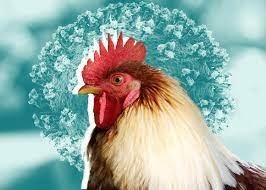
Your help is required in the control of avian influenza. The vital information you provide will aid in the protection of your birds and those kept by others and support the resumption of normal conditions as soon as is possible.
Email your contact details to surveillance@apha.gov.uk or phone them on 03300 416 589. Their team will complete a brief questionnaire with you, provide more detailed information and let you know what the next steps are.
Click down below to see the full advice sheet from the Animal and Plant Health Agency.
🏆AND THE AWARDS GO TO ...! 🏆
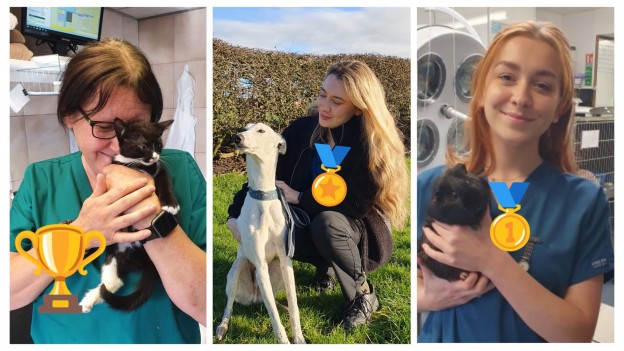
We are proud as punch to announce that not one, not two but THREE of our incredible nurses have been become award winners this week!
🥇Jane Wood - Best Clinical Coach at the Wigan Centre (for the second time!! 😎)
🥇Holly Cannon - The Wigan Centres Best Final year student 🐕
🥇Amy Bignall - The Wigan Centres Best First year student 🐭
We knew they were all fabulous anyway, but we're made up that they have been recognised for being the great Coaches and Students that they are!
Hip hip hooray! We are so proud of you all! ❤️
🐾🎭A STAR is born!🎭🐾
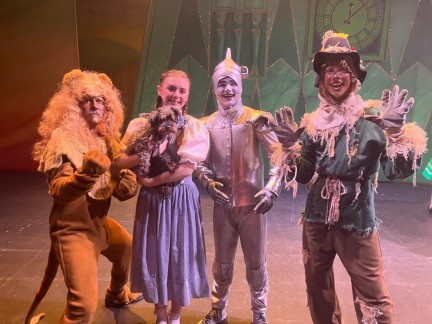
One of our very talented four legged clients took to the stage last week, with her debut as Toto in the Wizard of Oz! Cute little Dotty did her very best acting as she played alongside the cast of the Musical at the Storyhouse in Chester. What a clever girl, we're all super impressed!!🐶 Encore, encore!! 👏👏👏
*NEW* Update on Insurance Claim fees - From 1st October 2023

As of the 1st October 2023, we will be charging a nominal fee of £6.00 to complete direct insurance claims. We have held back from introducing this fee since the practice opened in 1984. Unfortunately, due to additional requirements from Insurance Companies, these fees have become necessary. If you pay your bill at the time of your pet’s treatment, as a gesture of good will, we will waive this fee.
For direct claims, we will require a completed and signed insurance claim form from you, or your permission to submit an online insurance claim at the time of treatment. You will need to pay your insurance excess and the £6.00 administration fee.
Once your insurers have settled a claim, you will be responsible for any further deductions that they may make.
If you have any questions, please ask Reception!
MacMillan Coffee Morning raised £1800!!
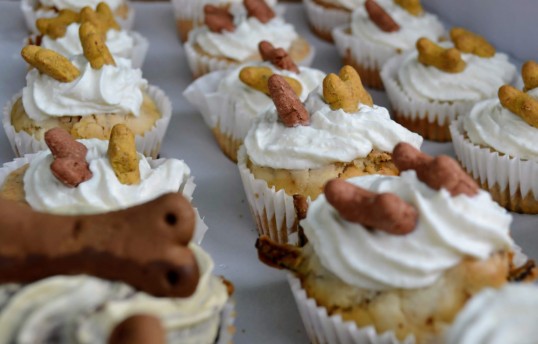
Thanks to all our amazingly generous clients, we managed to raise just shy of £1800 for MacMillan Cancer Support! Even the rain couldn't dampen our spirits! Our wonderful volunteers and super-duper organiser Laura, stood valiantly in the rain and sold cakes, raffle tickets, tombola tickets and more!
We had amazing homemade cakes and treats, and even Pup-Cakes, made specially for our furry friends!
Thank you again to everyone who donated their time and money to this great cause - We couldn't have done it without you!
HORSE VACCINES
Please note: We can only provide Horse Vaccinations for our own clients at present, due to a manufacturing issue with the vaccines. We will let you know if this changes at any time.
Thank you for your patience.
MacMillan Coffee Morning!
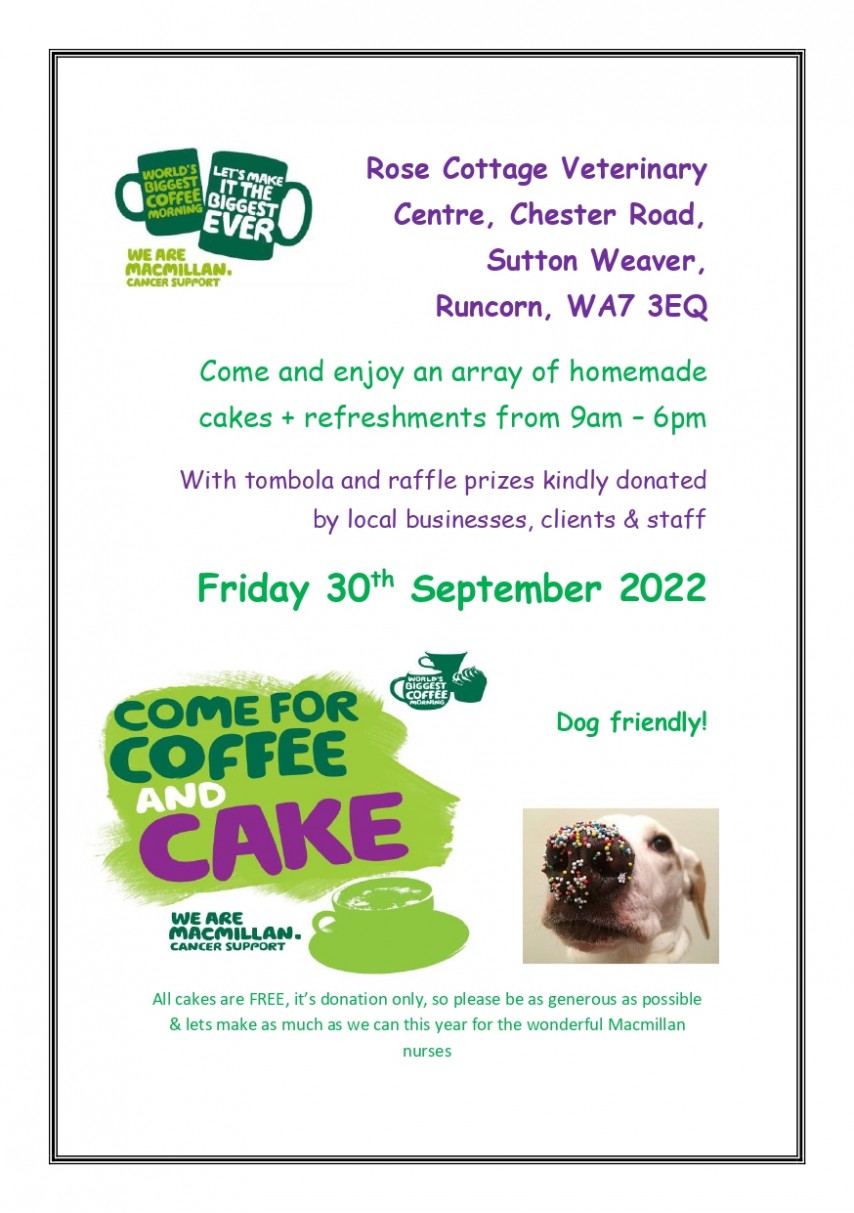
Gill's retirement
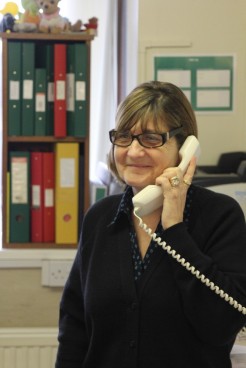
After 32 years, Gill has decided to retire and said goodbye at the end of March. Many clients have fond memories of interacting with Gill and this was shown by the many kind gifts they presented Gill with. She will be sadly missed for her lively and professional approach to reception. It will seem strange not hearing her characteristic voice and laughter at reception.
Best wishes in her retirement from all at Rose Cottage, both past and present.
Badly designed and dangerous hedgehog hut
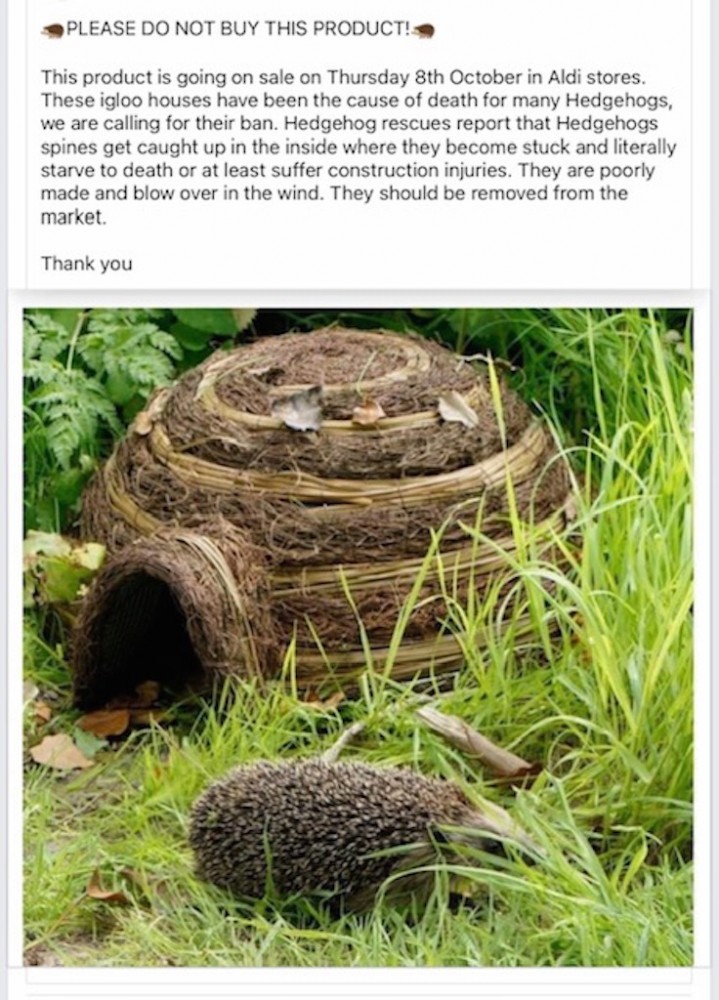
Preparing for Firework season
With approximately 40% of dogs in the UK fearing firework, it is a good idea for owners to start planning early, to help their dogs to feel calm and safe for when the season arrives.
WHY IS MY DOG SCARED OF FIREWORKS:-
Dogs are renowned for having a remarkable sense of smell, but their hearing is incredible too. Dogs can hear four times further away than we can, detecting significantly higher frequencies. Fireworks go off at irregular intervals with no warning, making loud bangs and whistles, which can trigger disorientation, anxiety and distress.
Noise aversion may be influenced by age, sex, breed and even genetics. Your dog's reaction to noise is largely determined by their personality and past experiences. Chances are if your dog was once scared by a firework, they will remember and be scared again.
Fortunately there is some good news, it is possible to help your dog have a calmer experience to fireworks. This is not a quick fix and will take lots of patience and perseverance, with the end goal being a calm, happy dog that can endure hearing fireworks without any stress.
START THE PLANNING:-
Check that your pet's microchip is up to date. Pets can react particularly badly to fireworks and spooked pets can run away. Statistics from recent years show that there has been a rise in phone calls to microchip companies, reporting missing pets at the end of October and beginning of November. Currently 53% of owners have incorrect details on their pet's microchip records. We cannot stress enough how important it is to keep your details up to date. (By law all dogs should now be microchipped with up to date details).
Create a safe hiding place and get your dog used to this area before fireworks start. Doggy dens are the perfect way to help your dog feel safe and secure. The area should be in a quieter area of the home. Fill the area with your dog's favourite toys and blankets, making it a cosy retreat and associated with positive experiences. Covering the area, making it dark is even better (this will help to block out any flashing lights). The area can be sprayed with a pet friendly pheromone, which can ease anxiety. (Ask your vet for more information and available products). The hiding place must always be available to your dog, even when you are not home. With time, your dog will learn the den is a safe and enjoyable place to be. When the fireworks begin, they may retreat to the safe place and feel more able to cope.
ADVICE FOR FIREWORKS SEASON:-
1) Walk your dog in daylight hours.
2) Top up your dog's water bowl, as anxiety can make your dog thirsty. Feed early before the noise begins. A stressed dog may not eat.
3) Close curtains and blinds to block out any flashing lights. Put on music (preferably classical music) or the TV to mask the sound of fireworks.
4) Never punish or shout at your dog for being scared, as this can cause long term issues.
5) Ignore the fireworks yourself and try to encourage your dog to play and exhibit normal behaviours, but do not force this. Dogs will pick up on your behaviour so remaining calm and cheerful will give your dog positive signals.
6) If your dog is scared and tries to hide, do not prevent them but rather allow them to do this and check them occassionally. Never force them to face their fears
7) If your dog comes to you for reassurance and comfort, do not ignore them, but reassure them calmly and quietly.
8) Always reward calm behaviour with treats and play.
9) Never take your dog out to a firework display. Even if they do not show any signs of distress, this DOES NOT mean that they are happy. Yawning, panting and lip licking can all be signs that your dog is stressed.
10) Never tie up or lock your dog outside whilst fireworks are ongoing.
Many of the above are also relevant for cats and small animals!
CATS:-
1) Make sure your cat is locked in on the night, in a safe and secure environment
2) Always ensure your cat has somewhere safe to hide. This may be under a bed or in a cupboard.
3) Never try to entice your cat out from their hiding place, as this will cause more distress.
4) Check that your cat is microchipped, and the details are correct and up to date
SMALL ANIMALS:-
1) If you have a small animal/s that usually live outside, try to cover half of the pen with towels and blankets to sound proof the area, while making sure they can still see out
2) Provide lots of extra bedding, so small animals can burrow and make themselves feel safe and secure.
3) You should consider bringing smaller animals indoors, so long as they are not upset with this and it is an option. This will need to be done gradually over a series of weeks, so they can adjust to the indoor temperatures and environment.
Compiled by Corinne Edwards BSc (hons)
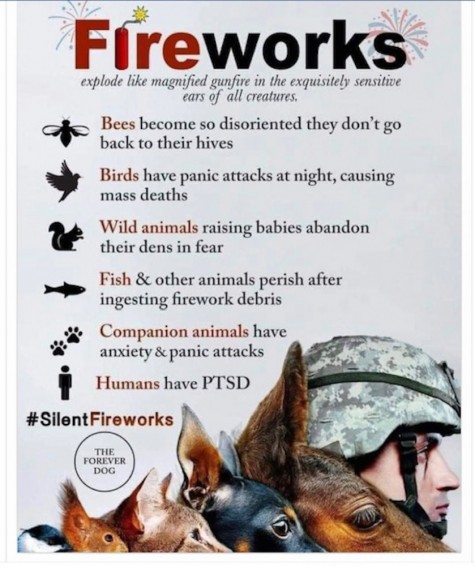
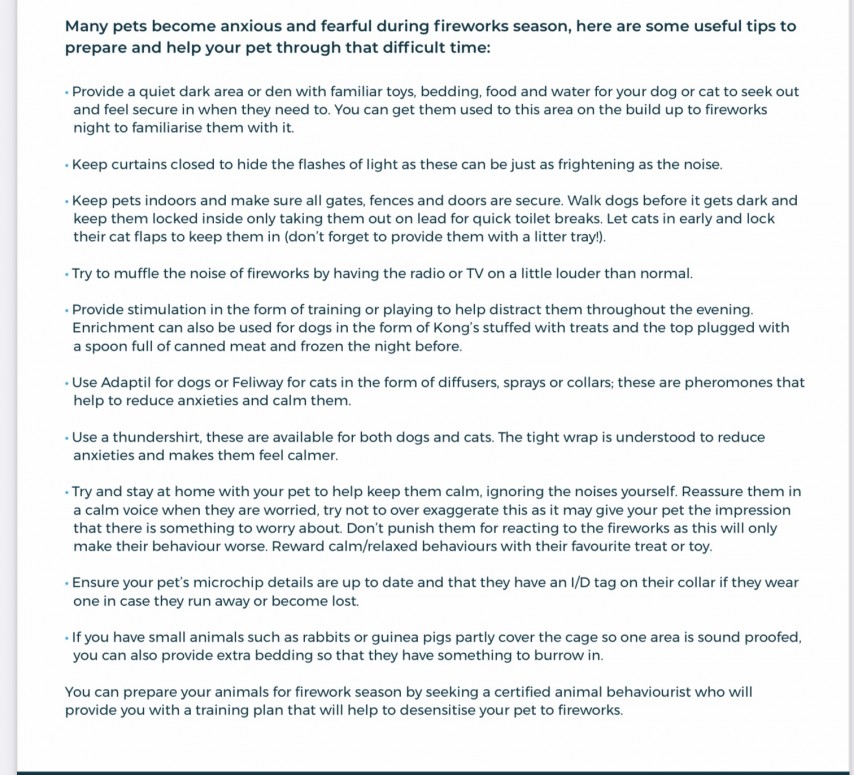
Pet Travel
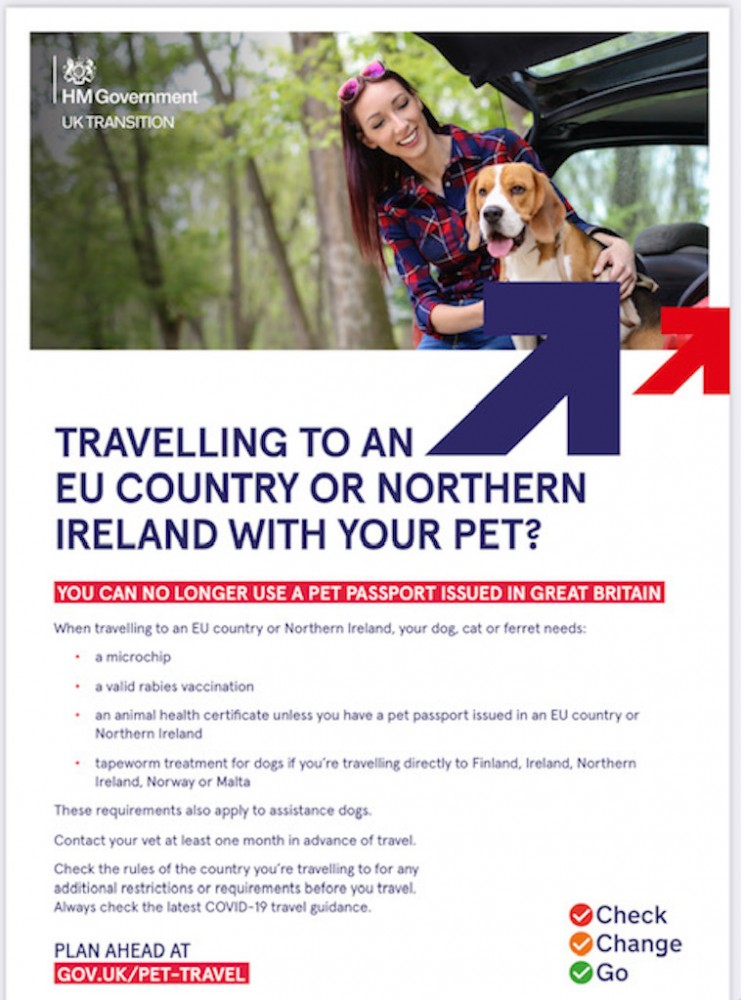
NEW ARTHRITIS TREATMENT - Librela & Solensia
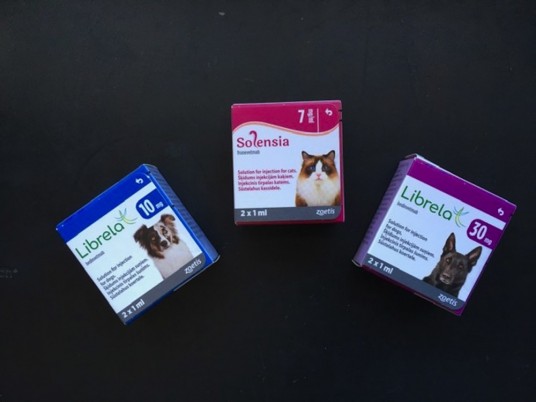
Zoetis has just released a revolutionary new treatment for arthitis in dogs and cats. Nerve growth factor (NGF) is a major cause of pain in osteoarthritis. These products are monoclonal antibodies that specifically target this molecule that causes pain, while not affecting any other organs in the body, in contrast to other arthritis medications like steroids and non steroidal anti-inflammatories, that can affect these. While these latter drugs still have a place, we now have a treatment that is very safe, with no recognisable side effects, can be given with any other medications and is especially useful in very old animals who may have kidney, liver or gut issues. They both come as injectable preparations, administered monthly. Early results have been very impressive, including treating staff pets.
Recognising the onset of arthritis can be difficult, as so often we hear " My pet is just slowing down with age". Most of these cases are because the dog or cat have developed arthritis and it is too painful for them to lead an active life. Treating the arthritis can have dramatic effects, allowing our pets to resume an active and happy life. This is especially true of cats, where arthritis is so poorly recognised as signs are more subtle, like poor grooming, becoming more grumpy, sleeping a lot more, poor appetite and reluctance to jump on to favourite spots.
If you feel unsure that your pet is suffering then discuss their case with us, and if they would benefit from this injection.
Remember AGE is not a disease!
IN MEMORY OF CHARLIE SUTTON
Mr and Mrs Sutton presented the practice with a lovely original and unique painting, painted by Carol Sutton, who is a local artist. It is in memory of their beloved dog Charlie, who passed away recently. It is in thanks for all the care we provided through his life. Many thanks for this kind gesture.
AVIAN INFLUENZA
The Ministry of Agriculture have declared a Avian Influenza Prevention Zone, in response to the confirmed outbreak of a highly pathogenic strain (H5N8) of avain influenza in England, Scotland and Wales. Please use the links provided for information.
LEGITIMATE INTEREST ASSESSMENT (LIA)
CHICKEN CARE
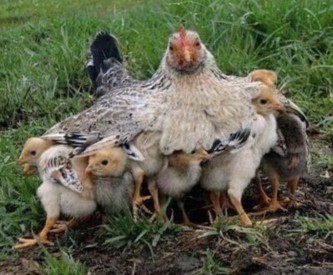
As we speed towards winter there are a few things we can do to prevent sickness in your birds.
UV and sunlight are wonderful antibacterials, its no coincidence that our hens seem to be healthier in the summer months! But as daylight and UV begin to diminish we need to keep on top of the simple jobs to maintain health in the flock.
1. Fresh, clean drinking water. Might seem like a no-brainer but chickens would rather not drink, than drink dirty water, and if they don’t drink then they can become dehydrated and stop eating.
2. Rodent control. Just like all other creatures, rodents want to find a warm house for winter too. However, rodents can carry diseases which can affect hens (such as Salmonella, Leptospirosis, mites, lice and tapeworms). There are several methods of reducing rodents in the chicken coop (feed in suspended feeders, don’t scatter food on the floor, use a pest control expert to help eliminate pests).
3. Worm control. It is very energy demanding to be feeding worms through the winter and weaker birds may become overwhelmed by a worm burden, leading to diarrhoea, lethargy and ill thrift. Worming is a good idea, or why not send us a faecal sample and we can screen it for you.
4. Reduction in egg production. Eggs are laid most frequently when there is plenty of daylight, and with reducing hours we can see our birds production slow down. This is a normal process, but if you are concerned about egg drop or if you would like to discuss artificial lighting then please give us a call.
5. The moult. Reduction in daylight can also trigger them to moult. The moult is a natural process where birds will get rid of the old tired feathers from the year, and produce newer ones. If your bird is moulting then it is important to change the diet to support the growth of new feathers, usually increased calcium and increased protein at this time will ensure a good strong feather is grown. Contact us if you would like to discuss hen supplements to support the moult, or if you would like more information on feather health.
If you have 3 birds or 30,000 birds, remember that we can create a unique flock health plan for you, and all it involves is a visit to see your facilities and a discussion about your needs. We can set up a regular parasite check and send you preventative medications to keep your flock in good health.
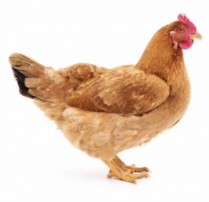
CONGRATULATIONS to Jane on her award
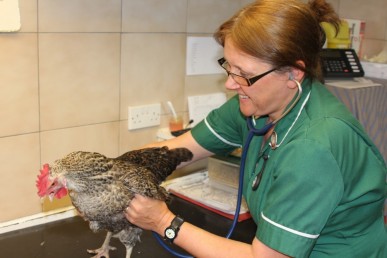
Jane, our senior training nurse, responsible for so many great nurses trained at Rose Cottage, has been awarded the Wigan Centre - Best Clinical Coach Award, by the College of Animal Welfare. This is in recognition of her tremendous efforts in training prospective vet nurses. She performs this task daily along side all her clinical work. We are all very proud of her achievement and are pleased it has been recognised with this award.
WELL DONE!!!!
New Look to our Practice
We have recently undergone some re decorating at the practice. The colour scheme has completely changed and we have some fun images on our consulting room doors. We would like to thank any clients affected during this period for their patience.
I am sure you will agree the end result was worth waiting for.
Here are some images :-
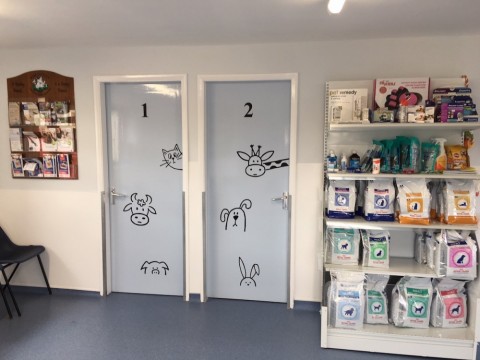
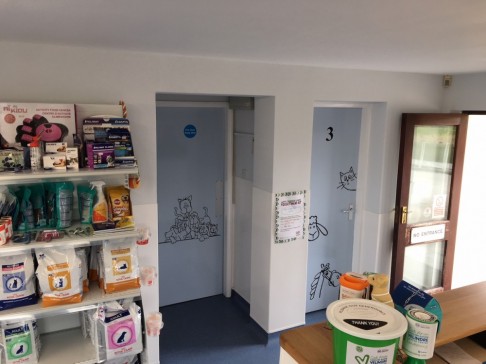
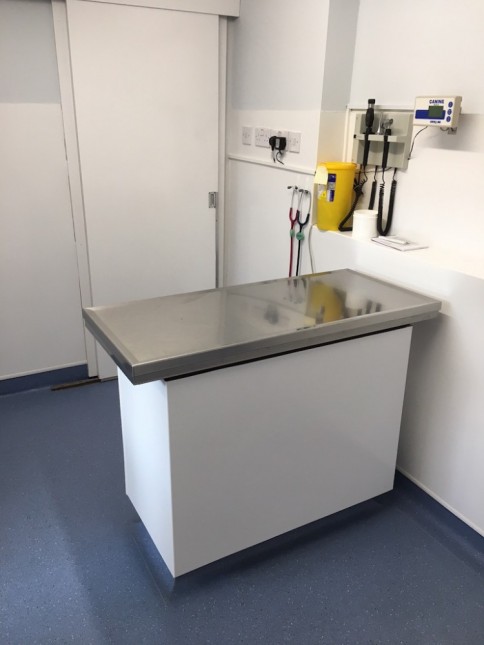
Palm Oil on beaches risk to dogs
Palm Oil blocks have been washed up on beaches along the Northwest and Wales. Dogs, because of their inquisative nature, are at risk of ingesting the palm oil, which can prove damaging to them and in some cases fatal. In mild cases, after ingestion, it can have a laxative effect but cause severe gastroenteritis. Large quantities could cause gut blockage. Dogs could develop a serious condition called pancreatitis, which can be life threatening, as a result of eating the fatty blocks.
Avoid your dog eating these on beaches etc.
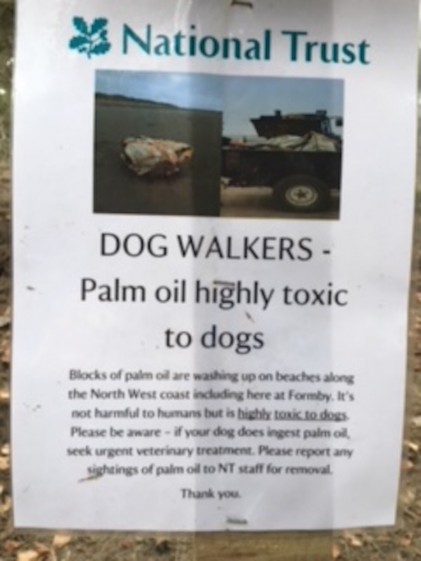
MacMillan Coffee Morning
Our 4th Macmillan Day. This proved to be our most successful yet, involving local businesses, clients and staff, and organised by Laura. Thank you Laura and her team for organising the day, and to all the people who donated, both clients and non clients! We smashed last year's total of £441.90, raising a total of £1,200 for such a great cause!!!!
CONGRATULATIONS
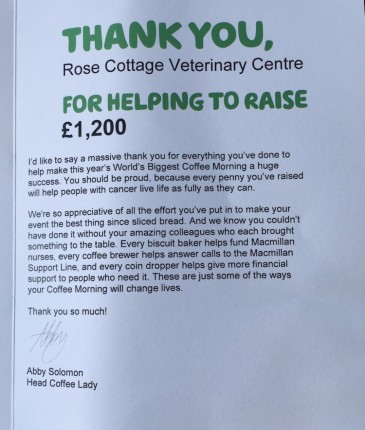
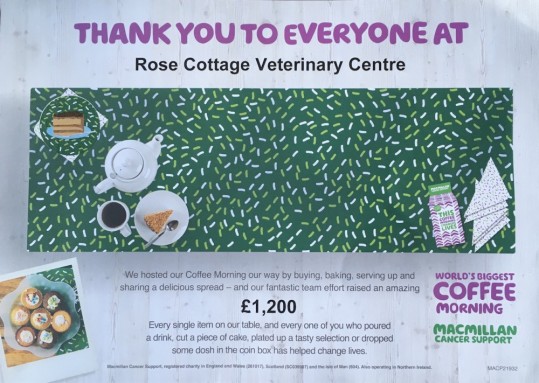
Fireworks
While there is a commercial product, called the Thundershirt, which helps calm distressed dogs, like during fireworks, the Philippine Animal Welfare Society has produced a diagram of a home made idea. The wrap is designed to calm your dog during periods of stress. While it would not work in all cases, it would be useful to try. Care should be taken not to tie it too tight.
See also our section on stress and use of Adaptil plug ins in the Veterinary Information section
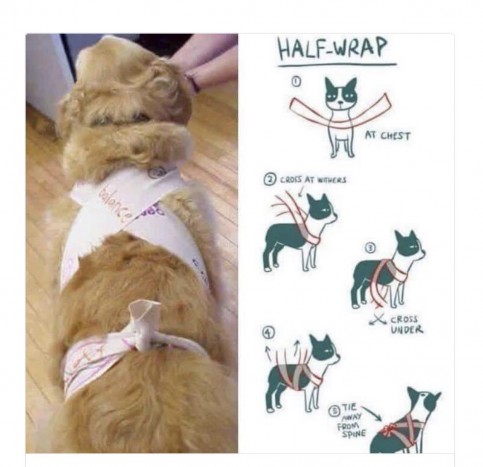
Chinese Lanterns Danger
TOY FOR BLIND DOGS
Watch the video in PETS PHOTOS section in GALLERY about Gizmo, who is blind, playing with a ball with bells in. This is a great idea by Mr and Mrs Wild.
VALENTINE'S DAY COMPETITION
Thank you everyone who entered the competition to match pets to the staff members who own them
CONGRATULATIONS!!
MRS PRITCHARD WON FIRST PRIZE, AND MRS BURKE WON SECOND PRIZE
Thank you Laura for organising such a fun competition
CLICK ON EACH IMAGE TO ENLARGE:-
MacMillan Fund Raising Coffee Morning

We staged a coffee morning for Macmillan Fund Raising which raised £441.90 to help the charity. The event was brilliantly organised by Laura, one of our nurses, who was assisted by various members of staff throughout the day. A tremendous thanks to all the clients who helped make it such a great day and thanks to Laura for all her hard work.
Fund Raising for Transplant Unit at Wythenshawe Hospital
Liz's husband Harry is celebrating 12 months since his life saving lung transplant by the fabulous team at the Transplant Unit at Wythenshawe Hospital.
"Harry's Countryside Celebration - Bank Holiday Monday 2nd May 2016.
Venue: North Lodge, Sugar Lane, Manley WA6 9HS
Attractions include:
Falconry display, Security dog display, Terrier racing, Family Dog Show, Children's crafts, Face painting and Pony rides.
Sheep shearing and Chain Saw sculptor demonstrations and a Farrier at work.
View a selection of vintage David Brown tractors, take a walk through the wood and see the pigs and sheep.
Gates Open 10.30am, Cars £10, single occupancy £5
Enquiries 07918 600 411
All Proceeds to Wythenshawe Hospital Transplant Unit. The Unit is one of only five national adult heart and lung units in the UK, with a patient catchment area of over 6 million covering the whole of the North West. "
A FANTASTIC DAY RAISING FUNDS FOR WYTHENSHAW
Despite initial poor weather, Harry's fund raising event was a great success. There were numerous stalls with home made cake and honey among some of the various items presented. Events included a falconry display, highly trained security dogs display, pony club, terrier racing, face painting, blacksmith, fun dog show, and there were various livestock displays. Wood carving and sheep shearing displays were interspersed with displays of old vehicles.
Harry and Liz would like to thank everyone for their support.
While the financial support is tremendous from the day, the greatest donation, costing nothing, would be to become an organ donor.
Lemur Leaf Frog Project
FILMING OUR INTRODUCTORY VIDEO
Terry, one of our clients, is a BAFTA nominated film maker (www.twisted-films.co.uk) and kindly filmed the welcoming video on our website. He was fabulous in getting the best out of the animals, and used his skill to produce an excellent video.
We had so much fun making the film, and it saw the welcome return of Henry the Meyers parrot who used to live at the surgery. He was such a star and behaved like one, needing several takes! Pru, the guinea pig, was filmed as if she was moving her lips talking, but actually happened when she was fed some greens while we were filming her!
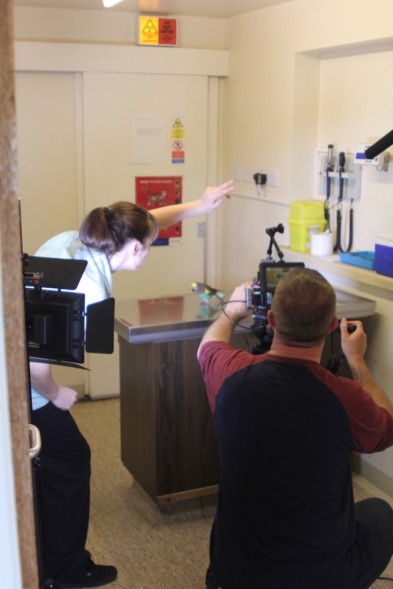
Ken used his own dog, Halle, for some of the filming and she did very well, with Jane doing her voice. There was one moment where we were filming the car approaching the surgery which should have had Halle in the back of the car, but we noticed in time that Halle was actually looking through the glass door in reception and would have been in shot. Terry's dog Tagg stole the show with his laughing belly rub!
Let us know what you think.
CHECK OUT OUR OFFERS PAGE
Check our Offers page for the latest deals.
OUR ABSENT FRIENDS PAGE
Have you lost your best friend recently? The loss can be unbearable, and take a long time to get over, if ever. We have set up a gallery page for you to remember your pet by. Email a digital photo of your lost pet to us, with a short tribute / message, and we will create a memory for you.
MANUAL OF CANINE PRACTICE
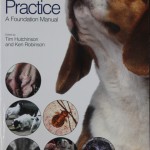 July 2015 saw the publication of the new BSAVA Manual of Canine Practice. Ken was one of the editors and wrote 2 of the chapters, on skin diseases and disorders of the paw. This manual will provide a practical source of information on canine diseases for young graduates and vets returning to practice after a period away.
July 2015 saw the publication of the new BSAVA Manual of Canine Practice. Ken was one of the editors and wrote 2 of the chapters, on skin diseases and disorders of the paw. This manual will provide a practical source of information on canine diseases for young graduates and vets returning to practice after a period away.
